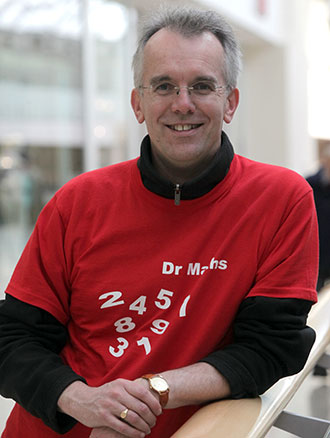June
The search begins to find the North East’s favourite number

Will it be lucky for number 7, a high five for 5, or will 8 be great?
It seems it’s not just Count von Count from Sesame Street who loves numbers, a lot of us are fond of them – and now an academic from Newcastle University wants to know which number is the North East’s favourite.
Whether it’s a birthday, house number, lucky lottery number or the shirt number of a favourite footballer, the search for the region’s favourite number is part of the Numbers Festival, which runs from Saturday 27 June – Sunday 5 July.
The programme kicks off at the Metrocentre in Gateshead, where staff and volunteers from BALTIC will be encouraging shoppers to help create a huge interactive artwork based on numbers. And Newcastle University’s Street Science Team will be out and about in Newcastle city centre asking people for their favourite number.
Taking place throughout the week are talks on topics ranging from the maths behind magicians’ card tricks to maths in music, and the Magnetic Universe.
There will also be events aimed specifically at schoolchildren, including a talk by ‘Murderous Maths’ author Kjartan Poskitt, and a careers event for pupils in years 10 and 12 highlighting career opportunities in science, technology, engineering and maths (STEM).
The Numbers Festival is the idea of Newcastle University's Steve Humble (pictured). Steve, aka Dr Maths, explains: “The Numbers Festival is a chance for people to think about numbers in a fun way and outside a classroom environment.
“Mathematical skills and an awareness of numbers can often be taken for granted or even something that maybe people don't think they have. But numbers influence our lives a lot.
“Many people prefer a certain number – perhaps for personal reasons, religious reasons or even mathematical reasons. I want the people of the North East to tell us what their favourite number is, and why.”
The Numbers Festival is supported by the Great North Maths Hub and the Institute of Mathematics. To submit your favourite number, and for the full programme of events taking place visit the website.
Number facts
• 13 is considered unlucky in some cultures. A popular explanation for the number 13 being unlucky is that the 13th person at the Last Supper was Judas Iscariot, who went on to betray Jesus. The superstition surrounding the number 13 has even led to some hotels and office buildings not having rooms or floors labelled 13, and in 2013, the Irish government introduced a new licence-plate system amid fears that drivers would be put off by a '13' registration number. Fear of the number 13 even has a name - triskaideksphobia.
• 3 also has significance in some religions, for example in Christianity, it can be seen in the Holy Trinity of the Father, Son and Holy Ghost and also the Three Wise Men.
• In Italy, the number 17 is considered unlucky. In China, it’s the number 4.
• 7 is not just the number of days of the week, Deadly Sins, colours in the rainbow, or even the number of dwarves that Snow White became friends with, it’s also a prime number – being divisible only by itself and 1.
• 12 is the number of months in a year, hours on the face of an analogue clock, signs of the Zodiac, the number of ribs in a normal human body, and the number of men who have walked on the moon. The number 12 is also important in many religions, mainly Judaism, Christianity, and Islam.
• Phi – otherwise known as the Golden Ratio, approximately 1.618, appears many times in nature, geometry, art and architecture. The ancient Greeks believed that if you measured your height and divided this by the distance from your belly button to the floor, the closer your answer is to 1.618 the more divine your body is.
• A googol is the name given to 1 followed by 100 zeroes, and inspired the name of the internet company. A googolplex, or 1 followed by 10100 zeroes, is an even bigger number. Astronomer and author Carl Sagan famously said that it would be physically impossible to write out a googolplex in full as it needs more space than is available in the known universe.
published on: 18 June 2015
